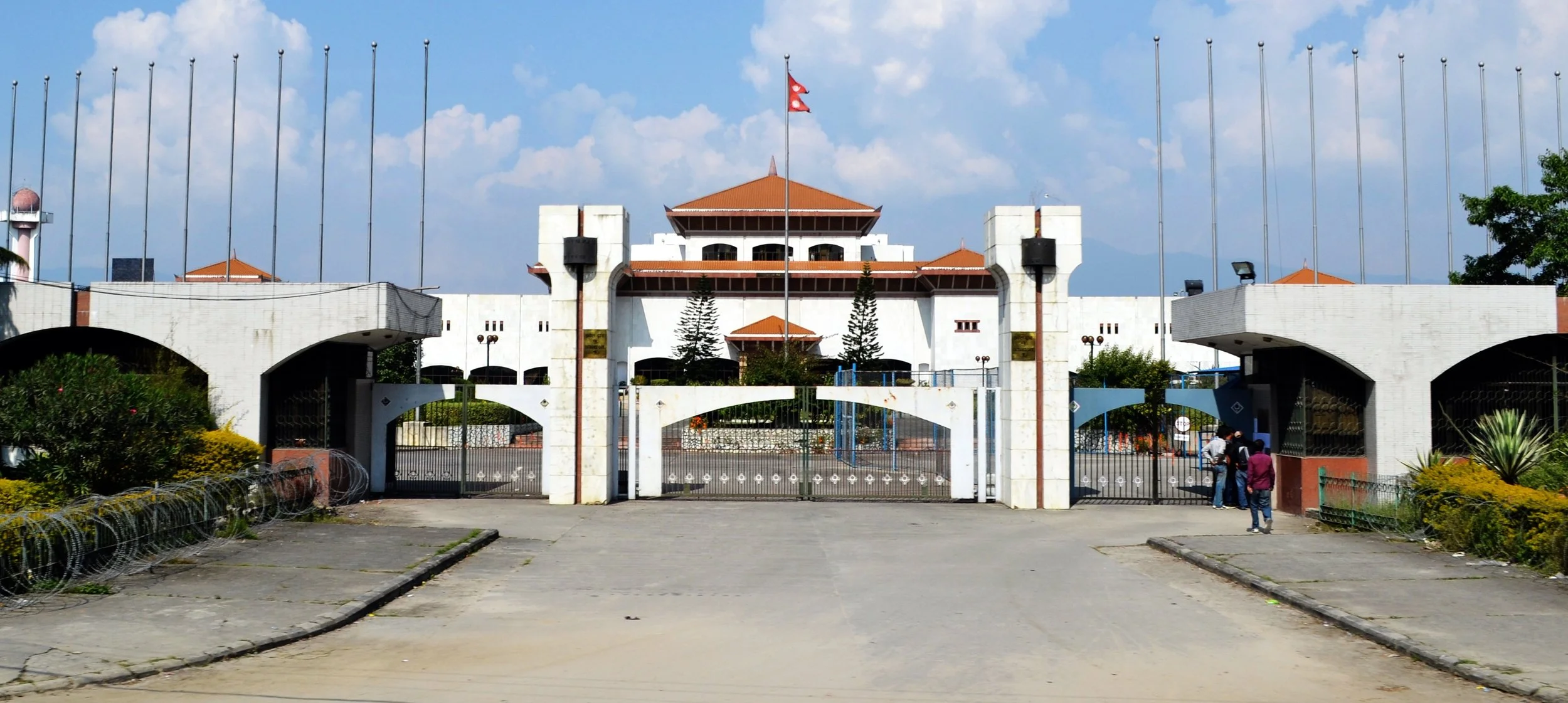Discord Democracy: New Leadership in Nepal After Violent Protests in Capital
Nepal’s Parliament building stands in Kathmandu during normal times. Protestors set fire to the structure as part of anti-corruption protests earlier this month (Wikimedia Commons).
Sushila Karki took over as interim Prime Minister of Nepal following the deposition of her predecessor, Khadga Prasad Sharma Oli, on September 12 according to Reuters. The leadership swap comes amidst a wave of national violence between September 8 and 9, which left at least 72 dead, more than 1,300 injured, and dozens of government buildings gutted by arson, including Parliament and the Supreme Court, reports the New York Times.
According to the BBC, the protests occurred in response to legislation that banned 26 social media platforms, among them Instagram, WeChat, and WhatsApp. Protesters considered the ban a move to stifle an anti-corruption campaign.
In Kathmandu, protesters stormed and lit fire to Parliament, the headquarters of the Nepal Congress Party, and the homes of politicians, including Oli, says Reuters. Police in the capital used tear gas, water cannons, and rubber bullets to subdue the crowd and imposed a curfew in districts near the capital, writes the BBC. Nationally, more than 300 local government buildings were damaged by violence.
The outrage prompted the government to revoke the ban as the army airlifted Oli and many lawmakers to barracks. The New York Times says it is unclear whether the army aimed to detain or protect them.
Army Chief General Ashok Raj Sigdel accused some protestors of exploiting the chaos to loot and destroy property. The army emerged from last week as Nepal’s sole functioning government institution. It has since actively engaged in talks with protestors and seeks to maintain stability until government functions can be restored, writes the New York Times.
Social media played a pivotal role in the organization of the protests as well as the ensuing negotiations. Protesters demanded a direct role in the selection of new leadership.
Hami Nepal (We are Nepal), an activism group, has assumed a moderating role between protesters, army leaders, and President Ramchandra Paudel, who will eventually swear in a new Prime Minister. Last week, it coordinated the informal referendum that nominated Karki on the social media app Discord, reported Al Jazeera. Before Karki’s inauguration, more than 100,000 people congregated in a chat room hosted by Hami Nepal to debate future leadership. The chat room was even broadcasted on national television.
Hami Nepal founder Sudan Gurung is engaged in talks with remaining government figures to fill critical cabinet positions, says Reuters. The organization maintains that it seeks no personal gain as a middleman.
In posts on Instagram it promised to find candidates to lead the Nepali people with integrity.
“Hami Nepal is not leading; we are simply a silhouette of your voices,” it said.
Meanwhile, Karki has called for elections on March 5 to replace current Parliament members halfway through their terms.
In a speech on September 19, Nepal’s Constitution Day, she vowed to uphold “civil liberties, fundamental rights…full press freedom, an independent and competent judiciary, rule of law, and good governance,” according to the Nepali Times.
Citizens favored Karki for her judiciary experience and staunch anti-corruption stance. In a brief stint as chief justice from 2016 to 2017, she campaigned for judicial independence, jailed an acting minister on corruption charges, and withstood impeachment proceedings brought against her for refusing to back a Chief of Police appointment, notes Al Jazeera. The United Nations proclaimed the latter move, “politically motivated,” and the government eventually dropped the case under mounting public pressure.
While major political parties have made few public comments, Maoist Party Leader Pushpa Kamal Dahal expressed “serious disagreement with the way the Parliament was dissolved,” per the New York Times. The Nepal Bar Association also made their unease known to Paudel in an open letter, writing that, “all problems should be sought within the constitutional framework while adhering to the Constitution of Nepal.”
However, for Nepal’s frustrated youth, the events of last week represent a hard-fought win against a government more focused on lining its own pockets than on providing for the people, per the BBC. Just this year, a former Prime Minister was charged with graft and faced up to 17 years in prison, reports Reuters.
According to the New York Times, especially egregious to protestors are, “nepo babies,” children of politicians whose TikTok posts feature designer handbags, luxury cars, and exotic vacations. The extravagance is especially stark in a country where GDP per capita falls just shy of $1,500 and 13 percent of the population works abroad to support their families. The current unemployment rate stands at 12.6 percent, according to data from the Nepal Living Standard Survey.
Karki certainly has her work cut out for her. In the next six months, she must orchestrate a national election in a country currently lacking a legislature or functioning ministries. Moreover, the New York Times reported that protesters torched the sole copies of basic financial records and even international treaties during the riots, complicating reform efforts.
Nepal also has a penchant for vacillating leadership. Since it discarded monarchic rule in 2008, the country has had 14 governments, per the BBC. No leader has completed a full five year term, casting an additional shadow upon Karki’s future.
According to PBS, the army lifted the curfew on September 13. Live Mint further reports that in Kathmandu streets reopened and children returned to school.
Karki has stated she is only in power to guide Nepal through the next difficult months. Promisingly, the army, which until two decades ago was answerable only to the king, seems to have embraced the opportunity for change. Although born out of violence, the youth movements infuse democratic movements in the region with new life, per News Line Magazine. As Nepal’s Constitution turned a decade old on September 19, Karki addressed a crowd in Kathmundu, reports the Nepali Times:
“The letters of the Constitution may be static, but its spirit is always alive.”

